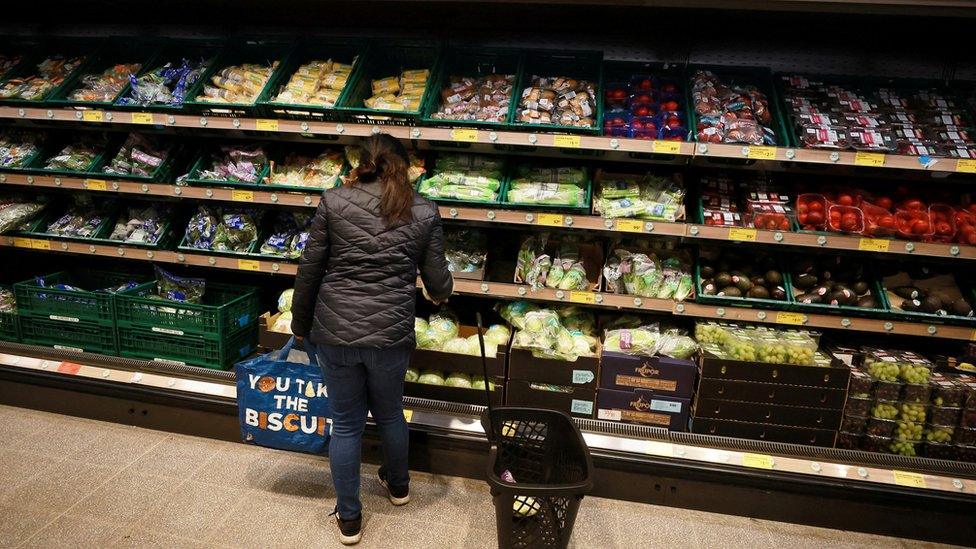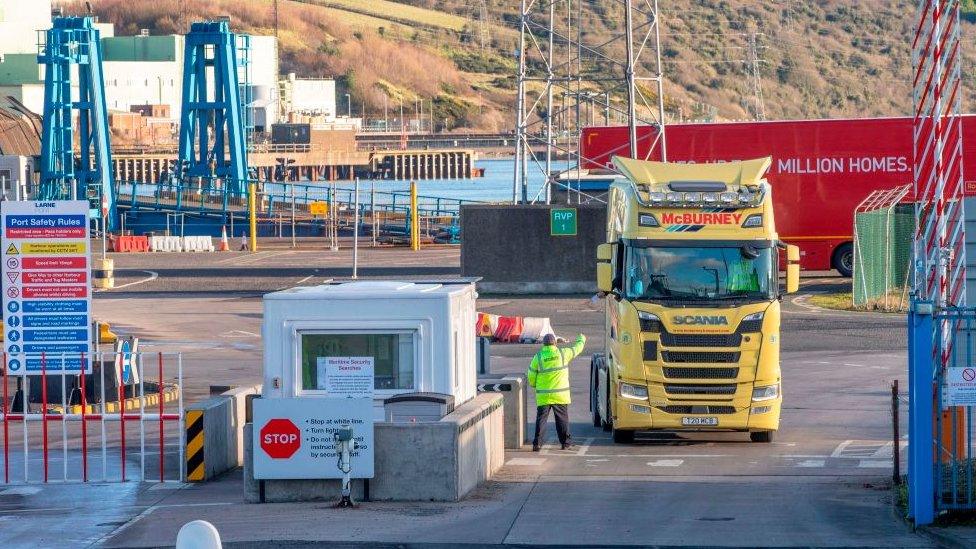Windsor Framework: Warning of fewer food options in NI shops
- Published
- comments

The British Retail Consortium said issues with the Windsor Framework could mean fewer choices on the shelves
The range of food products in Northern Ireland supermarkets could be cut, a trade body has warned.
The British Retail Consortium (BRC) said operational issues with the Windsor Framework must be resolved.
The BRC's director of food, Andrew Opie, was giving evidence to the House of Lords.
He said the issues "will need to be resolved quite quickly otherwise we would see an impact in terms of the choice consumers have in NI".
However, Mr Opie said "easements" mean consumers will not see any difference in October when key parts of the framework are implemented.
The framework, a post-Brexit deal for Northern Ireland, was agreed by the EU and UK in February.
It is intended to ease checks and controls on goods entering Northern Ireland from the rest of the UK.

The original 2019 Brexit deal for Northern Ireland - known as the Northern Ireland Protocol - kept Northern Ireland aligned with the EU single market for goods, which allowed a free flow of goods across the Irish border.
However, it made trading from Great Britain to Northern Ireland more difficult and expensive.
Checks and controls on Great Britain food products entering Northern Ireland were some of the biggest practical difficulties.
Under the Windsor Framework, UK public health and safety standards will apply for all retail food and drink in the UK internal market.
That means Great Britain retailers who sign up to a trusted trader scheme can send food to Northern Ireland through a 'green lane' which means no routine checks and minimal paperwork.
The flipside of this is the introduction of "Not for EU" labels on Great Britain food products, to give a level of assurance to the EU that products would not wrongly enter its single market.

Mr Opie said one of the remaining issues was whether all the manufacturers who supply the supermarkets will change their labelling.
He said supermarkets currently "have a fix" but are waiting to see if all manufacturers will "enter into the labelling agreement to allow us to move those products".
The "Not for EU" labelling is due to be implemented UK-wide next year.
Mr Opie said the other major issue was the treatment of goods which originate from outside the UK or EU and are sent to Northern Ireland via the supermarkets' Great Britain depots.
He gave the example of cooked chicken from Thailand which is often used in ready meals.
He said: "That comes straight into Great Britain, it's used in ready meals and then sent to Northern Ireland. But it's not processed and therefore doesn't meet the requirements of the green lane."
Practical implications
He said it would be "unfeasible" to carry green lane and red lane goods in the same loads which would mean retailers having to think about supply chains and which goods they sell.
The framework does make provision for some "rest of the world" goods to use the green lane but Mr Opie said there was still not a definitive list of which goods will qualify.
He said that as an overall assessment the framework had been agreed "without necessarily understanding the practical implications of what it meant for our supply chains".
Mr Opie added what was promised to industry was "really too simplistic, it was much more detail to actually deliver this".
He said issues could also emerge in future in terms of divergence for non-food regulation; for example, how the EU's new deforestation regulations might impact products sold by supermarkets.
Related topics
- Published2 February 2024
